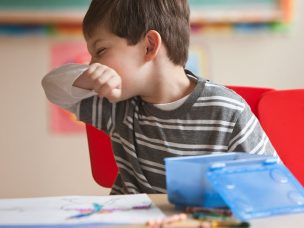Pulmonology
Inflammatory Biomarker Levels in Severe Asthma
Tezepelumab reduced the levels of T2 inflammatory biomarkers, leading to reduced exacerbations and airway inflammation in patients suffering from severe asthma. Asthma is a prevalent disorder in the global population, with approximately 10% of the world population suffering from severe asthma. Patients with severe asthma demonstrate uncontrollable disease despite the administration of inhaled therapies with...
Overweight Children With Asthma Less Likely to Respond to Treatment
Higher body mass index tied to poor response to inhaled corticosteroids There is a markedly increased risk for poor response to inhaled corticosteroids (ICS) among children with asthma and a high body mass index (BMI), according to a study presented at the European Respiratory Society International Congress 2021, held virtually from Sept. 5 to 8....
Post-COVID Conditions Are Common Among Adult Survivors
Incident conditions that may be attributable to COVID-19 are common among adult COVID-19 survivors, according to research published in the May 24 early-release issue of the U.S. Centers for Disease Control and Prevention Morbidity and Mortality Weekly Report. Lara Bull-Otterson, Ph.D., from the CDC COVID-19 Emergency Response Team, and colleagues used electronic health record data...
Childhood Asthma, Obesity, and Inhaled Corticosteroid Resistance
Researchers from the University of Amsterdam Medical Center investigated the relationship between childhood asthma and obesity. This relationship is characterized by reduced lung function, worse asthma symptoms, increased healthcare use, and poor response to inhaled corticosteroids. Their study suggests that children with asthma who are overweight or obese might be using inhaled corticosteroids with no...
Circadian System Worsens Asthma at Night
This study, published in Proceedings of the National Academy of Sciences, found that the brain’s circadian system plays an important role in the nocturnal worsening of asthma. Dr. Frank Scheer of Brigham and Women’s Hospital in Boston, Dr. Steven Shea of the Oregon Institute of Occupational Health Sciences in Portland, and their team conducted a study on...
Keeping Classrooms Safe for Kids With Asthma, Allergies
Parents of kids with asthma and allergies should prepare a plan to keep them safe as schools reopen, the American College of Allergy, Asthma and Immunology (ACAAI) says. Along with guarding against COVID-19, it’s important to protect against cold, flu and other viruses that pose a risk to children with asthma. That includes wearing masks,...
Lockdowns Cut Air Pollution, But Poorer Neighborhoods Benefited Less
If you thought the air was cleaner at the height of the COVID-19 pandemic, you weren’t imagining it. But clean skies were less evident in poorer areas of the United States, a new study finds. COVID-19 pandemic-related lockdowns reduced overall levels of nitrogen dioxide air pollution in many U.S. cities. However, levels remained higher in...
Americans' Lung Health: The Poor Suffer Most
The health of your lungs may have a lot to do with the size of your bank account, a new, large study indicates. The finding follows a six-decade look at lung disease risk among more than 215,000 American children and adults. In general, poorer Americans continue to have worse lung health than their wealthier peers....
Long-Term Disparities in Respiratory Health Persist in the U.S.
Benefits of improved air quality and reduced smoking have not been equally distributed according to socioeconomic status Income- and education-based disparities in pulmonary health in the United States have persisted and potentially worsened during the past six decades, according to a study published online May 28 in JAMA Internal Medicine. Adam W. Gaffney, M.D., M.P.H.,...
More Medical News














